Mobile field clinic established for patients with non-emergency respiratory illness
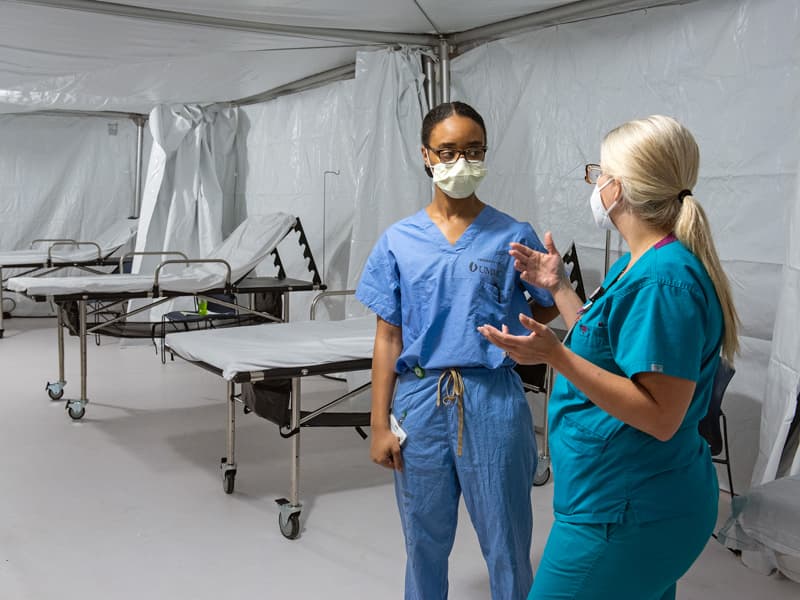
The University of Mississippi Medical Center is helping to ensure patients get the level of care they need by setting up a field clinic solely for those with respiratory issues who need to be seen by a provider, but who aren’t ill enough for a trip to the emergency room.
The clinic on the lower level of parking Garage B, near the corner of State Street and Woodrow Wilson Avenue, is not for walk-up care. In its pilot phase, it’s for adults and children, referred by a UMMC provider, who could have a respiratory illness, like influenza or strep throat, with non-severe symptoms. The facility can also serve patients with suspected or confirmed COVID-19 who have symptoms that require minor care.
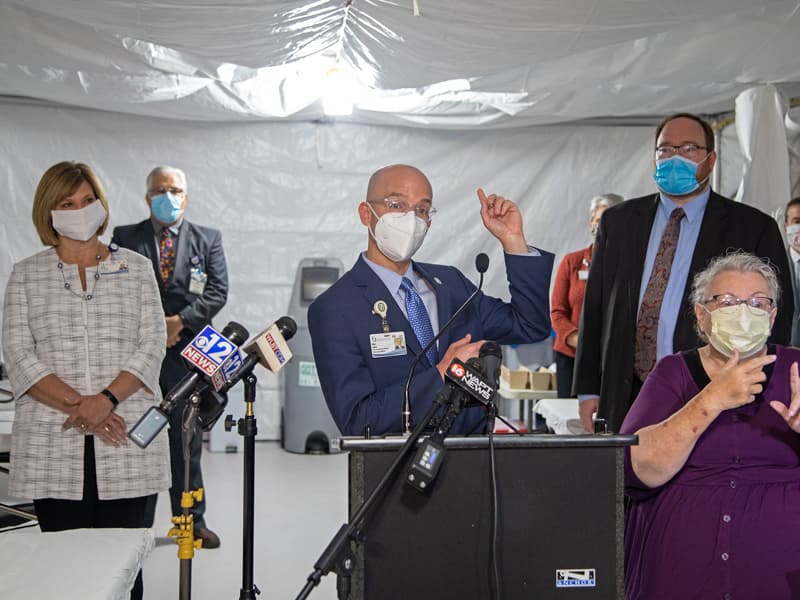
“This will allow us to alleviate pressure on our Emergency Departments and clinics, and get the right level of care to patients who need it most, at the appropriate time,” said Dr. Jonathan Wilson, the Medical Center’s chief administrative officer.
And, the clinic will be critical to keeping safe the patients seen in the adult and pediatric Emergency Departments who have injuries or illness unrelated to the virus.“We have a lot of ED patients who have chronic medical problems or who are immunocompromised,” said Dr. Alan Jones, chair of the Department of Emergency Medicine.
“We want to avoid the commingling. To protect our most vulnerable patients, an optional care site is our best option.”
It’s hoped that by the end of the week, the clinic also will see patients with respiratory illness symptoms who are referred by providers outside the UMMC system.
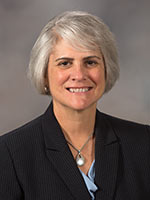
The new clinic “is designed to see patients that need to have a face-to-face visit with a provider,” said Margaret Head, chief ambulatory officer for UMMC’s adult hospitals. “In other words, the patient needs more than self-care at home, but does not need care provided by the Emergency Department.”
The area converted into a temporary clinic space is on the basement floor of Garage B, across from the Emergency Department and the side entrance of Wiser Hospital for Women and Infants. As a precaution, an ambulance will be parked outside the area to transport patients if they require further treatment at the pediatric or adult Emergency Departments.
Creating the clinic space is just one of the ways the Medical Center is ensuring patients, including those with COVID-19, receive the level of care they need.
“As we continue our preparedness efforts around COVID-19, this additional clinic capacity will be invaluable in meeting our patients’ needs,” Wilson said. “The conversion of the lower level of the parking garage gives us the opportunity to have this specialized clinic in close proximity to our Emergency Departments.
“This is certainly an unconventional clinic, but this pandemic has us all using unconventional ideas.”
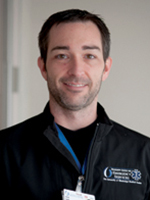
“Our models say that (the patient influx) will happen the second and third weeks of April,” said Jason Smith, manager of emergency services for UMMC’s Mississippi Center for Emergency Services. “That’s when we will see more of the people who are very ill, and will have the highest number of deaths per day.”
About 24 adult and pediatric patients can be examined at a time. They’ll be placed in mobile hospital beds used in disasters, separated by dividers for privacy.
The clinic is staffed by internal medicine and pediatric physicians, nurse practitioners, and both adult and pediatric nurses.
What they’ll be doing:
- Rapid testing for flu and strep
- Specimen collection for COVID-19 testing
- X-ray and laboratory blood work
- Checking oxygen levels and administering nasal oxygen if needed
- Antibiotic and steroid treatment
- Medical evaluation and treatment planning
UMMC’s use of parking garage space is similar to steps other health care systems are taking to cope with the pandemic. One example: Vanderbilt University Medical Center in Nashville last month outfitted part of a campus parking garage to create space between those possibly infected and those who are not.
A number of other hospitals nationwide have converted parking garage space into drive-through COVID-19 testing stations where the public can come to have specimens collected.
The UMMC clinic is not a replacement for screening for the virus by a provider, or for drive-through testing at sites across the state, including the Mississippi State Fairgrounds in Jackson. It also is not an alternative for patients who need emergency room care.
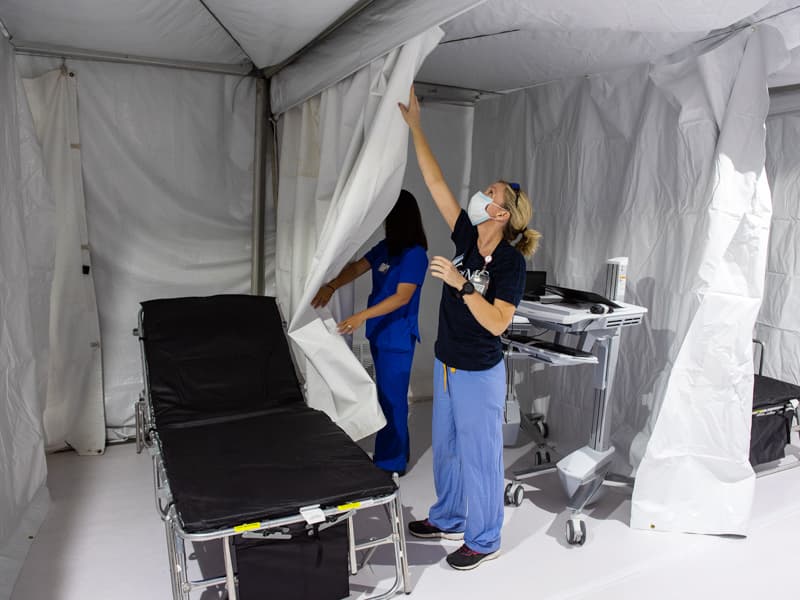
In addition, two trailers used in statewide emergency response are being stationed outside Garage B. “Depending on the curve or peak of patient care, and if the clinic area needs to expand, they will provide more shelter for care,” Smith said.
“The mobilization of the field hospital provides UMMC the infrastructure to expand our clinical services to unconventional areas, while still providing the highest level of care to our patients,” Wilson said. “Since our lessons learned during Hurricane Katrina almost 15 years ago, UMMC has been planning for supporting the state in finding creative solutions for a large number of patients due to a wide variety of scenarios.
“Fortunately, we’ve planned and trained for this type pandemic, so we are able to be as proactive as possible,” he said. “We are applying our lessons learned from past disasters to better serve our citizens during COVID-19.”
The Medical Center in recent weeks has rolled out innovations that include in-house COVID-19 testing developed by UMMC scientists and researchers; and creation of a respirator by Dr. Charles Robertson, assistant professor of anesthesiology, to be used if no more commercially manufactured respirators are available.
From all corners of the Medical Center, “the resourcefulness of our team here makes me very, very proud,” said Dr. LouAnn Woodward, vice chancellor for health affairs and dean of the School of Medicine.
“This is all about making sure the patients are receiving the right level of care,” Head said. “If you don’t need to be in the ED, then you shouldn’t be there. Or, if you need to be referred to a higher level of care, we will do that.”


